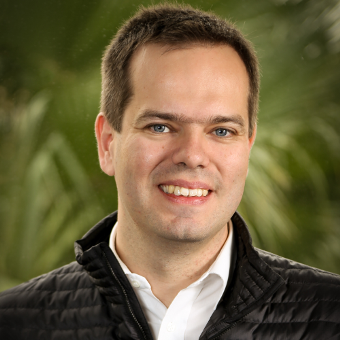Oct 12 - 15, 2020
Keynote Speakers

Westley Weimer
University of Michigan
Title
What Medical Imaging Can Tell Us About Code Review, Data Structures, Code Writing and the Brain
(Tue Oct 13, 13:00-13:45 UTC, Session Chair: Henrique Madeira)
Abstract
Within the last few years, medical imaging techniques that measure patterns of neural activity have been used to help us understand what goes on in our brains when we carry out software engineering activities. This talk provides a gentle overview of recent research in that area. We consider questions such as: "Does the brain treat reading code like reading prose?" "Are there neurological differences in how men and women carry out code review?" "Does the brain treat data structures like real objects in space?" and "Are there neurological differences between writing a method and writing an English paragraph?" We present recent work providing potential answers to such questions as well as a more speculative discussion of the implications for topics such as tool design, workforce retraining, and pedagogy. This talk assumes no previous background in medical imaging techniques or terminology. In-line references will be provided, but the presentation will focus on accessible high-level take-aways and interesting ideas.
Short Biography
Westley Weimer is a professor of Computer Science at the University of Michigan. His research focuses both on improving software quality through static and dynamic methods and also on the use of medical imaging techniques to provide better rigorous, grounded understandings of how humans engineer software. While perhaps best known for advances in automated program repair, his work in general has been cited over 14,000 times and has received four "Ten Year Most Influential" paper awards. He has also received the CRA-E Undergraduate Research Faculty Mentoring Award and three of the papers summarized in this talk feature undergraduate researcher authors.

Paulo Marques
Feedzai Inc.
Title
Machine Learning Business Critical Systems: Paving the way into the future
(Wed Oct 14, 13:00-13:45 UTC, Session Chair: Marco Vieira)
Abstract
“You test what you fly, you fly what you test.” There’s probably no better-known moto in the safety and business critical systems’ design community than this small phrase. It emphasizes not only testability but the importance of determinism and immutability after systems are constructed. Unfortunately, it’s becoming obsolete or, at least, largely inadequate as the world progresses. Machine Learning (ML) has taken the world by storm. This includes not only applications but also both business critical and safety critical systems. Today, all real-time and non- real-time financial transactions are evaluated using machine learning models; lane-assist and self-driving car technology are mostly based on ML; medical decisions and even prison-parole judgments are being backed by modern machine learning. As machine learning systems are mostly based on stochastic processes, this raises significant challenges in terms of determinism, repeatability, transparency, and overall safety. But the world doesn’t stop nor waits. In this talk we will discuss the challenges and lessons learned of building large scale machine-learning system for real-time risk management and fraud prevention. Today, at Feedzai, we process over $5 billion dollars’ worth of transactions per day, every single day, in real-time. If you have made a transaction in the last day, being a card payment, an online payment, or even a mobile payment, it’s very likely that our ML systems evaluated it and deemed it worth of being honored or blocked it. Building these systems is extremely challenging and we will examine what lessons can be generalized. In this talk we will cover not only the engineering aspects and its implications, but also the impact of having ML-based systems making autonomous decisions that impact human lives and outcomes, and what type of properties we would like such systems to exhibit.
Short Biography
Paulo is the Chief Technology Officer and co-founder of Feedzai, a leading data science and machine learning company managing risk and fraud prevention for worldwide financial institutions. Before founding Feedzai, Paulo was co-Director of the Carnegie Mellon University|Portugal Professional Master in Software Engineering program and had a dual appointment at Carnegie Mellon University and the University of Coimbra. Over the years, he led a large number of projects for the European Space Agency, Microsoft Research, Siemens among other companies. The projects ranged the design and implementation of safety and business critical systems, programming languages and runtime environments, virtualization, and software design. Paulo holds a PhD in Distributed Systems from the University of Coimbra, has authored over 40 peer-reviewed publications and a book. He’s currently Scientific Director of the CMU|Portugal program, member of the Forbes Technology Council, and an early-stage technology investor and advisor.




